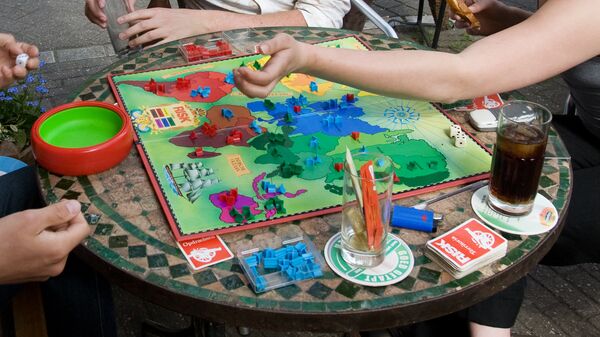Territorial Expansionism for Kids
The game, created with the support of the Ukrainian Institute of National Remembrance, describes the Polish cities and towns of Przemysl, Chelm, Sanok, Siedlce and Zegiestow as ethnic Ukrainian lands. The apparent goal of the game is to move pieces along Ukraine's so-called 'ethnic borders', with the first player to finish being the winner.
А ми уже тестуємо настільну гру «Українська революція 1917-1921 років», презентація якої відбудеться 13 жовтня на фестивалі «Історія.UA»!
— Memory Institute (@Uinp_gov_ua) October 3, 2017
Гра буде цікава і дорослим, і дітям
#історичнийфестиваль #ІсторіяUA pic.twitter.com/BVwCVqybRY
"We are already playtesting the board game 'One Hundred Years of Struggle: Ukraine's National Revolution of 1917-1921, which will be presented on October 13 at the istoriya.ua festival. The game will be interesting for both adults and children."
The game has led to controversy in Poland. Local media are concerned not just by its content, but by the fact that it is produced by Ukraine's Institute of National Remembrance, which has already been subject to significant criticism for its denial of the systematic murder and ethnic cleansing of Poles in western Ukraine by Ukrainian ultranationalists during the Second World War.
"Nationalist Madness"
"It has to do with the desire by Ukrainian nationalists to snatch up Polish territory," the academic explained. "They believe that if at least 5-6 Ukrainians live somewhere, it should be considered Ukrainian land."
Partacz plans to publish a new book later this year debunking these kinds of claims. "The Poles can also say that there are 368 Poles in Dnepropetrovsk and so this too should be considered Polish land," he joked. "This nationalist madness is akin to a severe and incurable mental illness. They [Kiev] cannot use or administer even what they already have. Basically, they are only able to destroy, and yet even this is not enough for them," he added.
On the one hand, these claims are laughable and ridiculous, Partacz said. On the other hand, however, such works "foment national hatred," and allow for arguments to be made in favor of seizing a neighbor's territories. In that regard, what is happening "is very dangerous," the observer stressed.
Asked why Warsaw has so far stayed silent on this and other initiatives by the Institute of National Remembrance, Partacz noted that unfortunately, Poland has a very strong pro-Ukrainian lobby, even in Poland's own Institute of National Remembrance. "For one reason or another, each of Poland's ruling parties, past and present, is subject to this influence. This is a disgrace and an embarrassment," the academic concluded.




